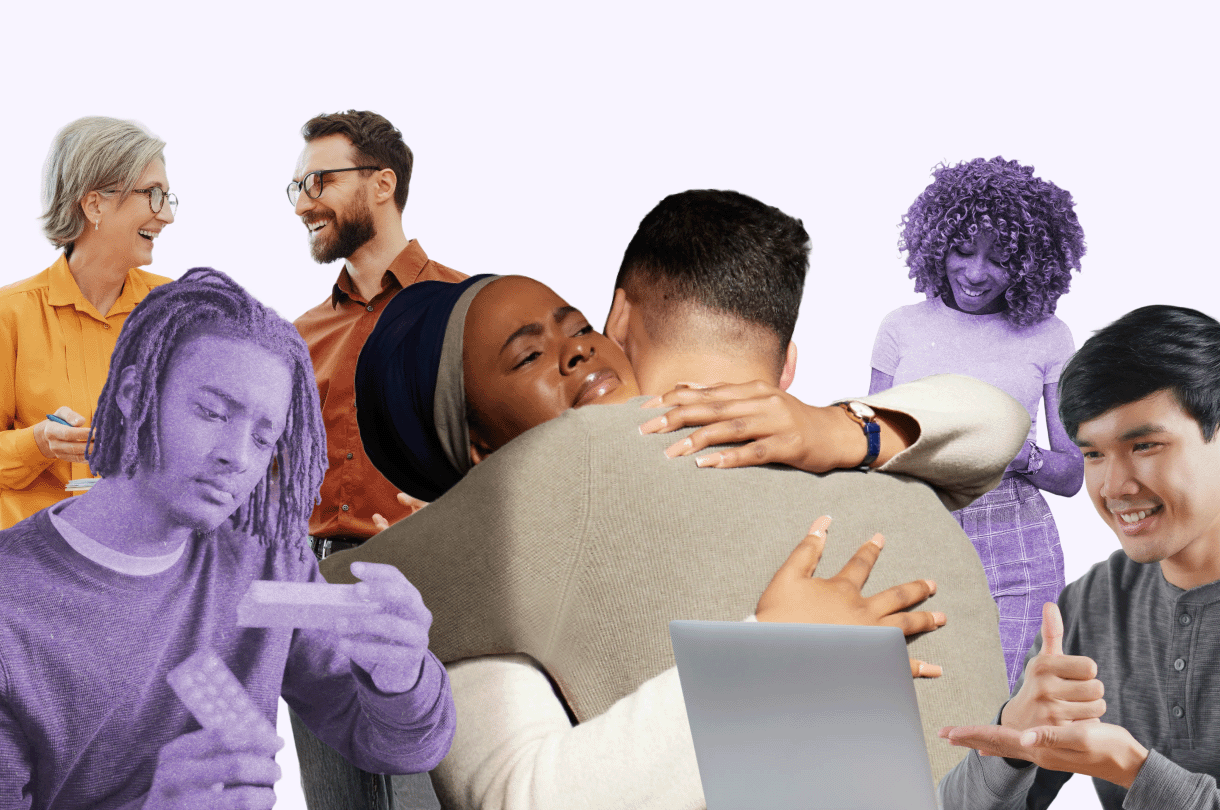On Tuesday, July 20, Spring Health hosted a webinar about creating more welcoming and inclusive workplaces for Trans, Non-Binary, and Gender Non-Conforming (TGNC) people. Inclusive workplaces lead to happier and more productive employees, more diverse job candidates, and higher employee retention. In fact, companies that are inclusive are twice as likely to meet their financial goals and six times as likely to be innovative. Employees who can be themselves at work are 42% less likely to leave within a year.The panel for Beyond the Binary included Rob Smith (He/They), CEO & Founder of the Phluid Project, as well as Zeno (He/Him/His) and Devin Norelle (Ze/Zim/Zis), who are Get Phluid trainers. We also heard from Bryan Aycock (He/Him/His), the Director of Benefits at Zynga, and Jean Malpas (He/Him/His), LMHC, LMFT, Psychotherapist and Founder of the Gender and Family Project at the Ackerman Institute of the Family. The event kicked off with a performance and story from Ty Defoe (He/We/They), two-spirit, indigiqueer multi-disciplinary artist, activist & writer. Watch the full webinar replay here, and checkout our key takeaways below.
Stigmatization and Mental Health Challenges Facing TGNC Communities
People who identify as transgender, non-binary, or gender non-conforming have higher rates of mental health conditions than those in the general population due to stigma and discrimination. Over 60% of queer communities suffer from depression; 45% have PTSD, and 36% have anxiety, and nearly 40% of self-identified transgendered people have attempted suicide – 10x the national rate. [embed]https://springhealth.wistia.com/medias/nfsrv7lz0t[/embed]In addition to a higher prevalence of mental health issues, TGNC people typically experience more barriers to mental healthcare, such as discrimination and a lack of knowledgeable, experienced providers. A significant percentage of individuals in the community either postpone receiving support or don’t get it because of disrespect or discrimination from providers.That’s why it’s essential for employers to provide comprehensive mental health benefits for TGNC people and vet providers for qualified and empathetic care prior to signing on with them.
The Importance of Community Care
In the face of extensive institutional discrimination, acceptance has a protective effect against many threats to mental health, including suicide. In a 2015 national survey, 60% of people who were out to their families said that their family was generally supportive of their transgender identity, while 18% said that their family was unsupportive, and 22% said that their family was neither supportive nor unsupportive. Those who said that their immediate families were supportive were less likely to report a variety of negative experiences related to economic stability and health, such as experiencing homelessness, attempting suicide, or experiencing serious psychological distress.“Acceptance is protection.”- Jean Malpas, LMHC, LMFT, Psychotherapist and Founder of the Gender and Family Project at the Ackerman Institute for the Family[embed]https://springhealth.wistia.com/medias/yp9nvknkp9[/embed]When someone transitions or expresses their true self, the people and communities they are connected with are invited to change as well. And sometimes families or coworkers will experience their own challenges. Because acceptance and support is a significant driver of mental health among TGNC people, it’s important for care to be inclusive of the broader community.
Supportive Practices for HR Leaders
“There are really easy things that employers can do… ERGs are a great place to start.” - Bryan Aycock, Director of Benefits at Zynga
At Zynga, Bryan aligned the company’s medical plan with the World Professional Association for Transgender Health standards of care, so that they now provide full coverage for gender affirmation surgeries, including cosmetic procedures. This demonstrates a strong commitment to TGNC people, but this level of care may not be immediately accessible for every company. [embed]https://springhealth.wistia.com/medias/1ssm4vtmsx[/embed]That said, there are many ways to be more inclusive:
- Update the language in employee handbooks to be gender-neutral
- Create ERG-focused home and recruitment pages that include relevant benefits
- Encourage the formation TGNC employee groups, so that they have safe spaces to share
How To Be an Ally
“...Use your privilege to begin the process of affirming spaces through policy and through language and through culture." - Rob Smith, CEO & Founder of The Phluid Project
Advocacy and inclusion are ongoing pursuits, but they’re actionable now. Often, becoming an ally is as simple as considering human experiences different from your own. Zeno and Devin-Norelle shared an easy acronym to help people be better allies:
- Act: Social pressure is a powerful weapon against discrimination and oppression. When you encounter someone behaving in a way that might exclude TNGC communities, like by misgendering a non-binary person, don't be afraid to confront them. Be kind, but firm. Explain how their behavior excludes or invalidates the experiences of others.
- Listen: Often, the most important thing you can do to make people feel welcome is to listen. If someone in your workplace calls out exclusion or discrimination, or simply wants to share an experience that affected them, give them space to express themselves. Do not interrupt, challenge or invalidate them.
- Learn: Curiosity and commitment are at the core of an inclusive environment. Because the TNGC experience is rich and varied, inclusion often requires a nuanced understanding of the ways in which our behaviors and language affect these communities. It is your responsibility to educate yourself on the best ways to include TGNC communities in our lives and workplaces, Now that there is an abundance of educational resources, from documentaries and articles to blog posts and social media hashtags, this is easier than ever before.
- Yield: It is inherently easier to occupy a space when you are part of a privileged community. Sometimes, that same privilege makes it difficult to see that the struggles of others are best addressed by those people. The most effective advocates for TGNC equity and equality are people from TGNC communities. Be aware of how much space you are occupying in group settings. If someone does something that isn't inclusive and members of TGNC communities are present, resist the urge to "save" them. Instead, yield to them. People in these communities should always be at the front of this work.
Watch the webinar replay for the full conversation. Spring Health is the most diverse provider network in the industry. 31% of Spring’s providers specialize in LGBTQIA+ mental health, 24% in Racial Identity and 23% in Gender Identity; 47% of providers identify as BIPOC (3x national average), 23% of providers identify as Black (6x national average), 15 unique racial groups are represented, and 27 languages are spoken fluently.










.png)





.png)
.png)



















